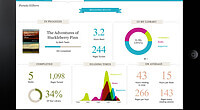
It’s sad that the writing of a full-length manuscript isn’t enough, but today’s publishing market demands more than just a good story. Unfortunately, writers who choose to self-publish are finding that the traditional publishing industry practically requires air-quotes around the word author when they attempt to introduce a query for a later manuscript. Some agencies and publishers even go so far as to say that the querying author cannot mention any self-publishing in their publishing credits.
So what does a self-published or digitally published author need to do to earn the respect of readers and publishing professionals?
Rochelle Levy, founder of Aziza Publishing, understands the plight of indie authors. While she spent much of her life writing poetry and short stories, her love of reading the work of others led her to build her own publishing house in early 2010. But the current trend of indie authors going blindly into self-publishing concerns her.
“When an author chooses to go it alone, he has to understand that there are a lot of ins and outs to the publishing business, and he could spend years learning all he needs to know,” says Levy.
Even more alarming are the manuscripts flooding the e-reader markets that have no business being available to readers yet due to weak story or character and plot development, poor editing, or inadequate proofreading. “Being rejected by every agent you queried is not a good excuse to decide to self-publish. There might be a very good reason that your manuscript hasn’t found representation yet.”
At the same time, there are some valid reasons to take complete charge of publishing one’s own manuscript. “Your book has to be something out of the box, something that has a non-traditional aspect and touches a nerve. You need everyone to be asking, ‘What is this book that everyone is talking about?’ and then rushing to get their own copy. If that doesn’t apply to your book, you may have a difficult time marketing it enough to be happy with your sales.”
If you feel certain that indie publishing is important to you, Levy recommends investing enough in your work to get it professionally edited. While her press accepts submissions through the same type of process like any of the larger houses and pays its authors royalties as any traditional publisher does, her company also offers its editing and design services to indie authors to help improve their manuscripts before they e-publish.
Levy offers several considerations to indie authors. First, the title matters just as much as any other text in the book. “We have a book coming out titled, Women Are Stupid & Men Are The Reason. I don’t care who you are, you’re going to pick that up and check it out!”
Beyond the initial reaction to the title, the reader has to have a reason to continue reading. “Ebony The Beloved, a title coming out in June, is a coming-of-age tale, which can be a really overdone topic, but this one hits you from page one. When I first read the submission I couldn’t put it down. My only thought was, ‘People have to read this.’”
Finally, there has to be an entertainment factor. Aziza has a title being released in the fall of 2011, Shadow Precinct, that doesn’t easily fit into a typical genre, but Levy’s first thought upon finishing the manuscript: “This has to be a movie!”
Jane Friedman, assistant professor of electronic media at the University of Cincinnati and a former publisher of Writer’s Digest magazine, offers some sage advice to anyone considering going solo: “Self-publishing to e-reader can feel very exciting and empowering…but it’s just as much work getting noticed by readers as it is getting noticed by the so-called gatekeepers. Given how many thousands of authors are now trying to get their e-books noticed, it takes as much persistence and determination as ever to become an established author.”
Indie authors who can feel confident that their manuscripts can bring all of this to their readers and can navigate the crucial aspects to publishing their manuscripts can hope to bring a history of exciting book sales to any future works they write.
Mercy Pilkington is a Senior Editor for Good e-Reader. She is also the CEO and founder of a hybrid publishing and consulting company.
